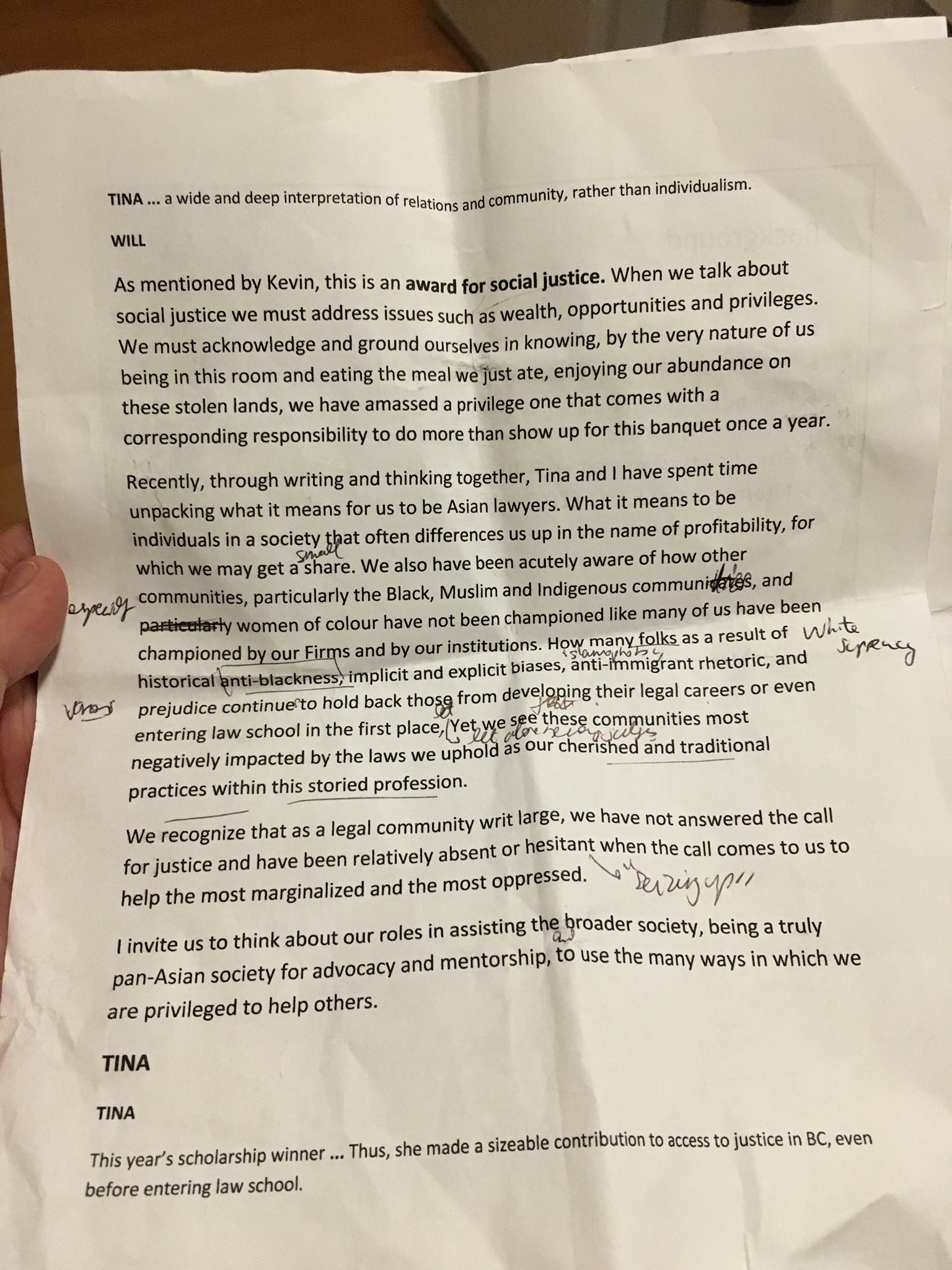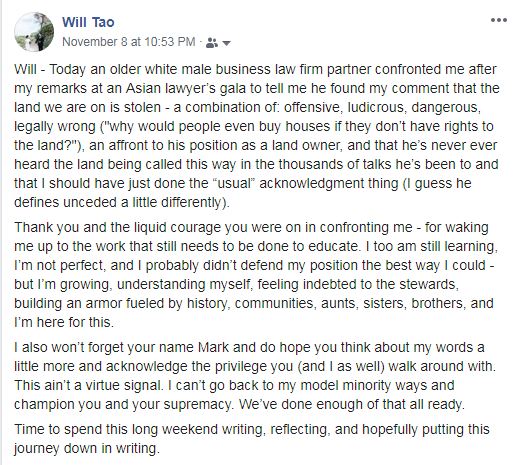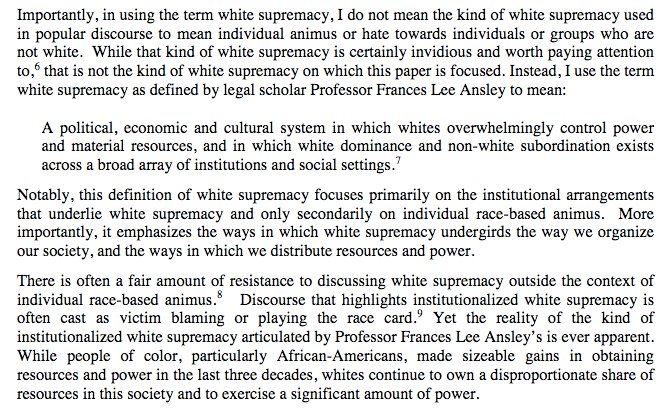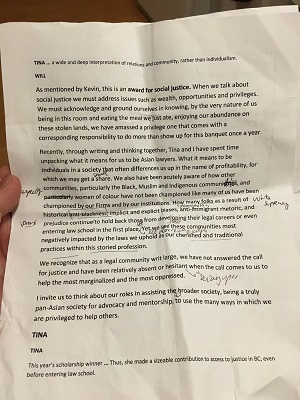Reflecting on My FACLBC Intro Speech – Two Days Later
I am writing two days after delivering a speech at the FACLBC Gala that raised some questions and controversy. I have heard feedback from a few individuals (Asian lawyers that I respect) that I came off a little ‘inflammatory’ and ‘strong.’ I have also heard from others that I ‘spoke my truth’ and ‘said what needed to be said.’ I have taken all this feedback in stride.
In this piece, I wanted to provide both a contextual background but also give you an insight into my recent journey. One key thing, as my mentor Kevin Huang (E.D. Hua Foundation) has continuously reminded me is that we’re all in different stages. I by no means wish to write this a way to impose my views onto others. At the same time, I had a truth, one that Tina and I had shared – and a story I will tell below of how we got there. I am aware that this may vary from processes others are going through in finding meaning and understanding in their work. We may all end up in different spaces and places – and being Asian does not mean we are all one and the same.
Some will be stuck in feelings of survival while others will reap benefits from the current system that will boost our individuality, award/reward us, and lay foundations for happy families that grow up in different financial/social circumstances. It is isn’t my place to tell you that you should or shouldn’t aim for that. Indeed, my past few years has been a direct struggle in trying to question the own path I was on, discussing these issues with family, and finding allyship within community.
Indeed, I feel more uncomfortable now in my legal work than I ever have as a result of this process of think through it.
The Speech and the Inspiration Behind It
Tina and I decided to step up to do this talk on Gabriola Island where we both attended a week-long workshop called Conscious Use of Power (https://www.inneractivist.com/conscious_use_of_power). We had both found out that we were appointed to the Awards committee and after a week of learning about our identities as both agents of oppression and targets of marginalization, decided this would be one way we could contribute. Tina and I had written a piece together in The Advocate trying to examine the challenges of being racialized lawyers and dissecting the intersecting marginalization and untold challenges we find ourselves subject to.
We were both reflecting on a series of challenges we were having/had in trying to advocate for social justice issues as Asian lawyers. We also thought that maybe acknowledging the fact that in many ways Asian lawyers have become privileged by the system and thus should do more to help address social justice issues might serve some good. We were fresh off conversations with Black women, Muslim women, and other individuals who called us in to do more in our respective fields.
Personally speaking, I had also gone through a lot of change. For those that know I made a major change in the spring of 2018, leaving a Firm that was more focused on the business of law and primarily served high net worth clients and corporations. I also saw myself head towards a toxic masculinity and relationship with power and money.
Transitioning into a progressive Firm (where I currently am at) has been hard on the mind and the soul. I have had to unlearn and rethink many things. I have also had to struggle with engaging in conflict, realizing the double-edged sword that is “stepping into my client’s shoes” in these new (more difficult settings), and the realization that progressive spaces can often be less coloured than corporate spaces. I have struggled with trying to understand the meaning behind pursuing these administrative tasks of law – researching the background and thought processes of mostly white judges, learning how technical rules work, and trying to understand administrative law functions/principles. At the same time, I’ve decided to invest more time into community where I am able to consult, volunteer, speak, and assist – but still not feeling I’m doing enough utilizing my role as a lawyer. Recently, I’ve spent my spare time reading critical race theorists, memoirs from racialized writers, trying to learn more about Indigenous communities that I had too often ignored both in my legal studies and in my lived reality.
Ultimately, I have questioned the very root of the work that pays my bills. I am a racialized settler on stolen land, a product of immigrants, that is using my privileges to help other settlers come here. I am a gatekeeper for a colonialist system that I have bought into. I profit off people’s mistakes. I hold up a system that refuses applicants from Africa at the same rates that many Western European applicants get approved at. I realized that I have avoided refugee work possibly because of the way the system is so confused on credibility and my struggle with trying to break down that concept with respect to racialized bodies. When litigating complex administrative law issues or being on the front lines of working in detention centres, I feel overwhelmed by the emotional gravity/unfamiliarity of the spaces or disconnected with the legal tests being applied/debated.
All of these factored into the speech below:

As I discussed below, generally Tina and I received good feedback (including one white man who came to us right after we spoke thanking us for ‘including the Indigenous piece’ but I did have the interaction I documented below.

There were many reasons I did not stay for the after-party social (the amount of time I have spent away from my spouse doing community engagements, primary among them) but honestly I was also tired. I have felt tired as a result of the weight of trying to break down and understand my complex relationship with my work.
Since posting my experiences, I heard from some attendees that my comment that the land was ‘stolen’ and then naming ‘white supremacy’ caused some uncomfortability at the tables. I faintly remember seeing Chief Justice Hinkson from the corner of my eye looking a bit uncomfortable as well.
I don’t want to get into the legalities raised by this colleague in our profession. Indigenous communities never ceded the land that I am on and for me that means it was stolen from them. Whether it was taken in other circumstances and areas with some sort of contract, the terra nulius and racial animus that underlined it, makes those transactions problematic. I don’t own these lands, nor do I believe I do when I buy a house. I do so on paper but not in reality.
On the point of white supremacy, I want to clarify to my Asian brothers and sisters that this term does not mean I am comparing white judges and lawyers to the KKK. White supremacy exists on individual animus/hate levels but my comments were addressed at systemic white supremacy, for which I will adopt the definition from Erika Wilson, UNC Chapel Hill in her excellent paper “The Legal Foundations of White Supremacy”:

I think Winston Sayson, QC in his speech highlighting the comments of the judiciary in the Komagatu Maru case, or if you look into the wording of earlier immigration acts, makes it clear that this was ingrained into the law and did not just ‘disappear’ along with racism. The explicit removal of these phrases and barriers has not meant they do not exist in other spheres, ones I am still working to unpack, write, and consult about.
I have been reflecting a little bit on whether it was the right time and place. While Tina and I had predicted the uncomfortability, there were other things I personally did not foresee. The one thing I regret was perhaps not seeing how our speech may have taken the limelight away from the winner of the award – a woman of colour. Tina and I discussed how we could use the words as a transition into lifting her work up and showing her off as an example.
I also was honestly not prepared for our speech to serve as a such a sharp contrast to the speech of Madam Justice Shergill. We had not known that her speech was about the very real ways in which we often create artificial barriers and how we have to have the mentality and mindset to push through. We also did not expect to go before the award honouring Winston Sayson, Q.C. who spoke about meritocracy and our need to work harder and to fight so one day we cease to exist as an organization. Again, those used to be the ways I felt as well, arguably even when I was serving as a Board member as FACLBC just a few years back.
Another moment also resonated with me. I had a mentor I highly respect come up to me and ask me at the FACLBC Gala if i was “still doing immigration work” after having seen likely my recent written pieces and advocacy,
I feel like this dichotomy doesn’t necessarily exist but when you are Asian it does and it is limiting. The reality is today, by virtue of the way we work, we have to run business ventures while serving community and family in our own ways. Yet, I will be honest in sharing that for this very reason I have disconnected with close friends and struggled (in some circumstances) to enjoy new relationships – feeling often times neither ‘here’ nor ‘there’ in trying to grapple with how much I am a business and an advocate at the same time.
These days I constantly feel guilty about the work I choose to do or do not do. I feel too privileged in social justice spaces to be sharing my perspectives and the same uncomfortability in privileged spaces, where I often disengage from conversation. It is a journey many of us are having; how we create our own spaces to talk about this, heal, and balance work and social lives will be determinative of our ability to be both happy and motivated to keep doing this work.
This morning as well another friend/mentor posted something on Facebook that resonated with me. Do we do our work in “love” or “anger”? Should our goal to do work that eliminates the need for affinity and move beyond our differences to a world where we are all one. This was likely how I saw diversity and a future a few years back but today I can’t say I see it in the same lens. I think capitalist societies will have to operate where someone is doing the labour and someone is making the profits. There will always be those on the outside and the bottom, they will more than likely be darker-skinned and visibly different (be it many persons with physical disablities or trans-community members), and I feel it is the role of Government, social services, and human goodness to hold them up. I also think we need to tackle this notion that people of colour cannot be ‘angry,’ that we have to ‘smile’ through our oppression, keep our head down and work, and ignore systems that need changing. I have really resonated with the teaching of Dr. Ken Hardy when he talks about trying to turn anger (enrage) into productive outrage which is to be embraced (see his piece: here) . I do see a real fear in destructive rage where we do not give space for individuals to be angry or speak truth to the inequities they see.
“That’s the Problem with You People” – A Note on Self-Care
These days I have been reflecting on how much of a burden I am taking on in my own mind trying to work through these issues. I need to give it time to be free and breathe.
I had an example of this. Just earlier today Olivia and I were crossing the road. A woman was walking ahead of us with her dog in tow. The dog was falling behind. As much as we tried to get it to move. The lights were about to change. I was worried about the dog and turned around trying to hold it and bring it to it’s owner. The dog ended up avoiding me and almost swerving into the road. Thankfully, it didn’t get hit and returned on it’s path.
The woman turned around and looked at me with her tired eyes. “Why did you turn around to grab my dog?” I stammered, I was worried. I didn’t want it go get hit. She answered “that’s the problem with you people. Save yourself first”
The idea that everyone’s problem and every social problem is now my problem has been a burden that I need to eventually shed. A mentor showed me his cup recently which said “Not My Circus, Not My Monkeys.” I told him I wish I could do that, but I cannot at this stage.
I am not a politician (nor do I inspire to be one at this stage). I simply am taking up too much head space worrying about things and issues I cannot control. I have also ignore my own health through this process, putting on weight, forgetting to disconnect, and frankly it’s become a problem. I’m going to start going back to therapy to discuss this as I sprint into my 31st year on this planet later this week.
I likely will need time ENTIRELY away from work in December but I have taken enough time this year. Olivia (my spouse) and I are also living like many in this city paycheck to paycheck and when you factor in the financial impact breaks have for contractors, there is no incentive to take extended time off. Even when we are on vacation, our work and clients follow us. It’s rare for Olivia and I to take a full day these days where we are not talking about work or our obligations – the realities of survival as racialized persons in an increasing tough town).
I am trying new ways to engage myself in this work. I need to. I may also have to jump into spaces to start doing the work that I would love to and start proactively saying ‘no’ to other work. If I am interested in policy, writing, looking at race equity, trying to litigate – I cannot continue to dabble in these spaces in order to make meaningful change. I have to commit time to writing, try and jump into human rights and race equity more substantively, and perhaps determine that there are groups I cannot help even if that work may be financially profitable or routine. This will truly be a test of values and I hope to have some of your encouragement, feedback, and mentorship through this process. I am grateful that in one of my new roles I mentor law students – and this work has given me the ability to mentor and work on my commitment to accessible justice and education.
Starting to Bring Together Asian Justice Advocates in Conversation
Going through the internal struggles I am going through and having conversations with others (particularly women of colour, junior lawyers, and recent law school graduates) who are experiencing the same thing I have decided we need to start organizing. One of our first plans is to create a safe and regular space to meet to talk about this. We do not intend to replace any current affinity group but also recognize that we need to have conversations within select small circles that do not encompass outside influence. We also need to widen the circle so it is not just lawyers talking, that we include other professionals, legal assistants, non-profit representatives, in better understanding our role and identity within the law.
I am looking forward to this as a healing journey and I invite those that are interested to reach out to myself, Tina, or Justin Choi so we can begin building and growing these ideas together in the coming months and into the new year.
I hope you enjoyed reading through this piece. My apologies for the lack of brevity (as usual).
Perhaps I can focus on breaking down this administrative law argument now that I have gotten this off my chest.

